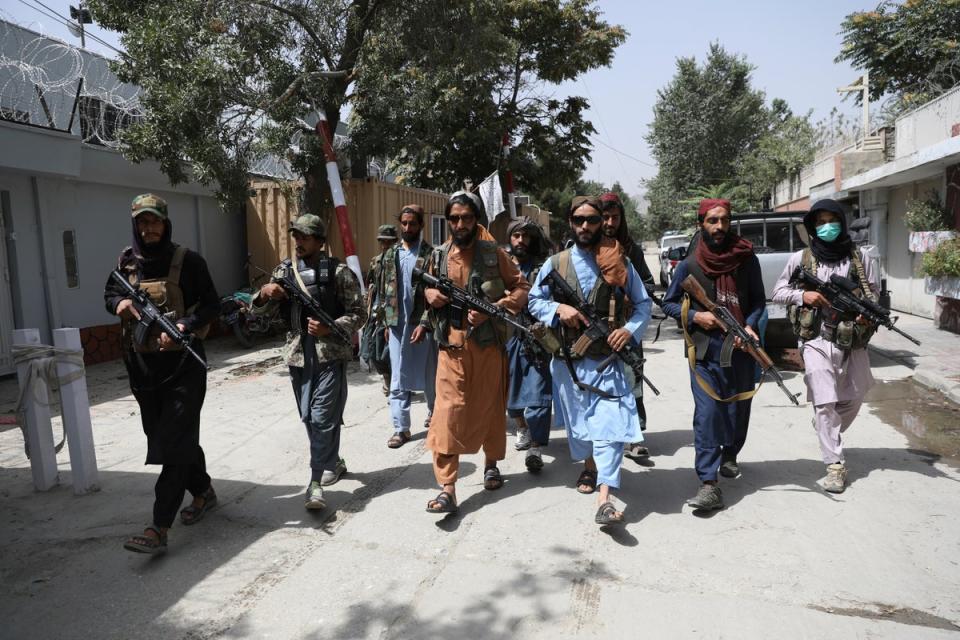Killings, torture and a target on their backs: the plight of ‘collaborators’ left behind in Afghanistan
When an Afghan pilot was this week granted asylum in Britain following a campaign by The Independent, he was overjoyed. But his happiness was overshadowed by fears for his wife and children who – like thousands of others – remain in mortal danger under Taliban rule in Afghanistan.
Two years since the fall of Kabul, those suspected of working alongside the toppled UK-backed administration live in isolation, poverty and fear, still with a target on their backs. Every day, they risk being subjected to forced disappearances, torture in prison and extrajudicial killings, despite the Taliban promise that it would not seek revenge.
The situation is “dark”, according to human rights workers documenting the Taliban’s killings and spree of imprisonments against Afghan nationals who worked in the Ashraf Ghani administration. They warn there has not been any improvement in the treatment of those affiliated with the previous West-backed administration since 2021.
The pilot’s case underscores the grim reality faced by scores of so-called “collaborators” with the West.
Since the Taliban takeover in 2021, 31 per cent of the human rights violation cases recorded by international monitor groups have involved former military servicemen, such as the Afghan pilot, 26 per cent involve former police officials and 22 per cent were former provincial goverment workers.
And these figures only represent the confirmed cases, says Qasim Wafayezada, the former minister of information and communication in the Ghani administration. He adds: “Certainly he [the Afghan pilot] would have faced the same fate.”
Zaman Sultani, south Asia researcher at Amnesty International, agreed that the situation is very bleak for Afghans who were part of the foreign security forces.

“Amnesty has investigated several cases of extrajudicial killings and the majority of these people were found to be members of the former government and security forces,” he told The Independent .
“In addition to the obvious, these members are facing the threats of forced disappearances, torture, and detention. We are seeing that the Taliban is accusing these former members of not handing over their weapons or they still have the linked positions in order to level charges against them.
“So it is clear that the Taliban is still looking for ways to harass them.”
The threat of forced disappearance or extrajudicial killing would not have stopped with the pilot himself, experts warn. Taliban attempts to seek reprisals typically trickle down to target’s families as well, including their children.

“We’ve seen cases where the Taliban could not hunt down a member of former security officials so they went after their family,” said Mr Sultan. In one particular case he investigated, even cousins were targeted.
The UN Assistance Mission in Afghanistan (UNAMA) has recorded 218 extrajudicial killings between August 2021 and June this year. Arrests frequently result in bodies being found within days, months or, in some cases, not at all.
In that same time, UNAMA has recorded at least another 800 human rights violations against former Afghan government officials and security forces.
In June last year, the Taliban attacked the home of a man linked with the former government and killed six members of the ethnic minority Shia Hazaras: four men, a woman and a girl.
Meanwhile, one family member, who has not been named for security reasons, described how they found the body of their son, who served as a police officer in the former interior ministry. They said they saw “signs of many bullets” in his body and said that “dogs had eaten some part of his body”.
The man was arrested just 10 days after the Taliban takeover when he was returning to Kabul. Some Taliban fighters had spotted his photos with ministry officials.
Another man who served with the Afghan National Defense and Security Forces (ANDSF) recounted his abuse while being detained by the Taliban.
“They told me: ‘You have supported the Americans to kill Mujahideen and the Afghan people. You are an infidel. You are not a Muslim. You are a dog of the Americans. The Americans evacuated their good friends but their dog is still here. You will receive punishment for what you have done against the Taliban in the past’,” the former security member told the UNAMA.

Incidents such as extrajudicial killings spiked in the immediate aftermath of the fall of Kabul, but Amnesty officials said that did not necessarily mean the situation has improved now.
There are still recent cases of extrajudicial killings being recorded in Afghanistan up until the present day, Mr Sultan said.
The former air force lieutenant, who fled the regime and came to Britain across the Channel on a small boat, was granted asylum this week after a five-month-long campaign by The Independent. But he has been told it could take at least nine months to make a successful family reunion claim, so that his young family can join him in the UK.
His loved ones also face a risky journey to Pakistan just to provide their biometric details to the British authorities for the visa application. The UK government demands the process is done in person, and there are no offices left in Afghanistan.
Rather than having to wait in limbo in Pakistan for many months, campaigners have called on the government to make this family one of the exceptional cases in which biometric fingerprinting can be done once they are brought immediately to safety in the UK.


